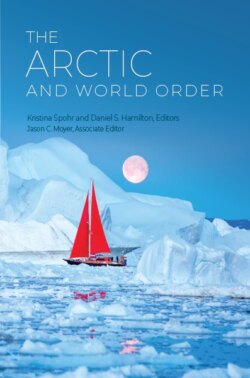Читать книгу The Arctic and World Order - Группа авторов - Страница 14
На сайте Литреса книга снята с продажи.
The Slow-Moving Pandemic and the Future of the Arctic
ОглавлениеAs of this writing, we are in the midst of a global health crisis that has shaken the whole of humanity, caused a tragic number of deaths, and led to economic hardship and social upheaval not seen in many generations. Its effects are rippling across the globe. Yet global warming has not stopped because of COVID-19. In fact, climate change could be considered as a slower-moving pandemic, with differing yet equally or even more disastrous effects: cascading natural disasters, freakish weather events, and loss of wildlife and habitats, all generating climate refugees and mass migratory movements likely to shake polities and provoke conflict.
In many ways, the Arctic is humanity’s canary in the coal mine—an early warning sign of the extremes this slow-moving pandemic can cause, the place where the implications of the recent UN declaration of a planetary “climate emergency” are most palpable.88 Partly for these reasons, the Arctic has also become a focal point for intensifying geostrategic tensions, a space where political and economic interests collide with ecological and cultural sensitivities.
Insofar as the Arctic Eight and regional Indigenous people have continued to cooperate in the Arctic Council and have acted within the wider international regime based on universal norms and principles, the Arctic remains an exceptional region—one that has sought to insulate itself from global powerplays and tensions. At the same time, it is an arena where all powers are watching their backs: each is seeking to shore up its Arctic status and its stakes in a region where mineral riches and maritime passages await to be exploited politically, militarily and legally. The rhetoric of nationalism and conflict threatens to squeeze Indigenous voices and the language of peace and collaboration.
With global environmental and political change entwined, we are thus confronted with a double-edged reality, a paradox of enticing opportunities and incalculable riches that might be exploited for short-term gain, and of appalling long-term dangers that irreversible natural destruction may bring. As we glimpse the future of the Anthropocene—the horizon of 2040—complex questions abound, pertaining to peace and war, life and death.
It remains to be seen how far the Arctic regime can adapt to new expressions of nationalism, whether resource extraction can really proceed in a sustainable manner, and whether the Arctic as a zone of peace and collaboration can survive the changing global political dynamics that encroach on it. The essays in this volume offer important perspectives on the issues at stake and the processes under way.
